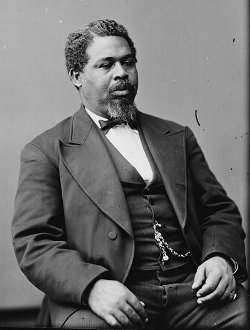Early on the morning of May 13, 1862, a lookout on the U.S.S. Onward spotted a Confederate steamer heading out of Charleston Harbor directly toward the Union blockade. Commander F.J. Nickels was about to fire when he saw that the steamer was flying a white flag. “The steamer ran alongside and I immediately boarded her, hauled down [the] flag of truce, and hoisted the American ensign, and found that it was the steamer Planter, of Charleston, and had successfully run past the forts and escaped.”
The transport ship’s pilot, Robert Smalls, had resolved to escape slavery by steaming out to the Union warships blockading his city. When the ship’s white officers had gone ashore that night, he directed his eight fellow slaves to fire up the boilers and guided the ship to a nearby wharf, where they collected their families. Then Smalls donned the captain’s hat and coat and gave two long and one short blasts on the whistle as they neared Fort Sumter, as he had seen the captain do. The sentry sent him on his way. As he made for the Union fleet three miles away, he put up one of his wife’s bedsheets as a flag of truce.Harper’s Weekly called the theft “one of the most daring and heroic adventures since the war commenced.” In his Naval History of the Civil War, Union admiral David Dixon wrote, “The taking out of the ‘Planter’ would have done credit to anyone, but the cleverness with which the whole affair was conducted deserves more than a passing notice.”
Smalls was given a monetary reward for the captured Planter and went on to serve in the South Carolina legislature and the U.S. House of Representatives. When Abraham Lincoln asked why he had stolen the ship, he said simply, “Freedom.”

No comments:
Post a Comment